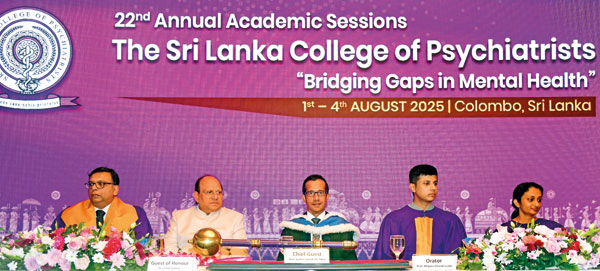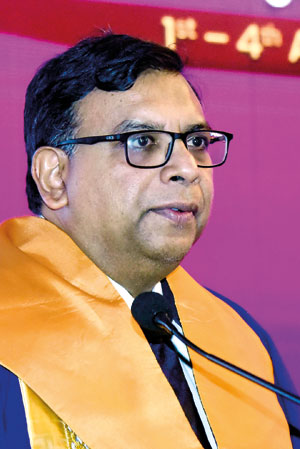News
Sri Lanka hit by Psychiatrist migration – North-East Provinces severely impacted
View(s):- College of Psychiatrists President Dr. Sajeewana Amarasinghe urges vital steps
to ensure mental health and prompt introduction of new Act
By Kumudini Hettiarachchi
The war-affected North-East Provinces, with the highest suicide rates in the country, are severely affected by the dearth of psychiatrists caused by brain drain, with the specialists serving in those areas stretched to their limit.
This was revealed by the President of the Sri Lanka College of Psychiatrists (SLCPsych), Dr. Sajeewana Amarasinghe, on August 1 at the inauguration of their 22ndAnnual Academic Sessions in Colombo.
Stress, anxiety and worry were evident as he laid bare their troubles – the difficulty of maintaining services due to the migration of psychiatrists; the child and adolescent mental health crisis; the insensitive reporting of suicides; substance addiction; and the need to get the Mental Health Act passed speedily.

The head-table (from the left): Sri Lanka College of Psychiatrists President, Dr. Sajeewana Amarasinghe; Guest of Honour & Board Member for South Asia, World Psychiatric Association, Dr. Vinay Kumar; Chief Guest & Judge of the Supreme Court, Justice Janak De Silva; Orator & Professor in Psychiatry, Faculty of Medicine, University of Kelaniya, Prof. Miyuru Chandradasa; and college Secretary Dr. Malsha Gunathilake. Pix by Akila Jayawardena
On the theme ‘Bridging Gaps in Mental Health’, Dr. Amarasinghe elaborated on the disturbing statistics about psychiatrist-migration: Sri Lanka has a total of 108 Psychiatrists – 71 certified as specialists by the Post-Graduate Institute of Medicine (PGIM) and 37 Acting Psychiatrists awaiting full PGIM-certification and Senior Registrars in training.
Of these 108 Psychiatrists, the Health Ministry employs – 77 (Board-certified – 44 & Acting – 33); the universities employ – 25 (Board-certified – 21 & Acting – 04); and the military/Kotelawala Defence University employs – 06.
In the sub-specialities, Sri Lanka has Child and Adolescent Psychiatrists – 05; Forensic Psychiatrists – 02; and Old Age Psychiatrists – 02. Eight of these 9 sub-speciality psychiatrists work in the Western Province, explained Dr. Amarasinghe, pointing out that General Adult Psychiatrists provide sub-speciality services in all other areas.

Dr. Sajeewana Amarasinghe
He underscored that the Health Ministry was finding it “extremely challenging” to fill the vacancies in the vulnerable North-East Provinces. According to the Mental Health Policy of Sri Lanka, all districts should have at least one psychiatrist and the college has worked closely with the Health Ministry’s Transfer Board to maintain crucial psychiatry services. “The college has stood firmly by this principle at the cost of being unpopular.”
Conceding that migration of psychiatrists to Australia and the United Kingdom (UK) has always happened, but following the recent economic crisis it has reached “alarming” levels, Dr. Amarasinghe suggests some vital steps to retain psychiatrists for the benefit of the people.
“These include the provision of incentives by the government to psychiatrists working in regional centres because they are living far away from home; get poor salaries; they have poor accommodation facilities; there are no schools for their children; and they have very little private practice. This situation is exacerbated by the lack of medical officers, staff and medications, while the attitude of a few administrators is sometimes callous,” he said, posing the valid question: “Who would want to work in rural Sri Lanka, when there are highly-paid jobs in Australia.”
He urged the authorities to encourage young psychiatrists to work for at least five years giving something back to the nation, while telling his colleagues and juniors that the Australian state sector will not get filled in the near future.
“We will not be able to fill the vacancies in rural Sri Lanka until there are vacancies in Australia,” he lamented.
Meanwhile, several activities had also been launched by the college to reduce substance abuse and make its “no, no” stand on proposals to produce a low-cost alcohol product as well as legalise the use of cannabis clear to the authorities.
A strong need is also for the new Mental Health Act to become a reality before too long, added Dr. Amarasinghe.
The college oration on ‘Topiramate as an Adjunctive Strategy in Schizophrenia: Unveiling its Role in Symptom Management and Metabolic Modulation’ was delivered by Prof. Miyuru Chandradasa, Professor in Psychiatry, Faculty of Medicine, University of Kelaniya.
| Apt cover ‘The Challenge: A mind trapped in a dark spiral, trying to embrace love and light. Bridging this gap is the journey of mental health.’ This was the apt description of the colourful cover of the abstract book of the sessions, by Dr. Dinithi Kodikarachchi, Senior Registrar, University Psychiatry Unit, National Hospital of Sri Lanka (NHSL), Colombo. Concern over mental health crisis among children A major concern for Dr. Sajeewana Amarasinghe and the college was the mental health crisis among children. “There had been 80 child suicides in 2024 and according to the ‘Global School-based Student Health Survey 2024’, other data included suicidal ideation over 12 months for 15% children and attempted suicide – 6.8%,” he said. The college-UNICEF survey on child psychiatry services had brought to the fore Dr. Shreenika Weliange reporting a “pressing” need to improve the Child and Adolescent Mental Health Service. The Friendly School Programme jointly set up by the Health Ministry and the college had a multidisciplinary approach including the education of school principals/vice principals. He said that the college was also working with the Prime Minister’s office on proposals to reduce stress, limit social media usage by children, reduce homework, train school counsellors, educate teacher trainees and enhance mental health. Focusing on insensitive reporting of high-profile child suicides by some sections of the media, Dr. Amarasinghe said that to bring about awareness on the need for sensitive reporting, the college held a joint media conference with the Sri Lanka Medical Association (SLMA) and a two-day workshop with the Mental Health Directorate, for journalists. | |
The best way to say that you found the home of your dreams is by finding it on Hitad.lk. We have listings for apartments for sale or rent in Sri Lanka, no matter what locale you're looking for! Whether you live in Colombo, Galle, Kandy, Matara, Jaffna and more - we've got them all!

